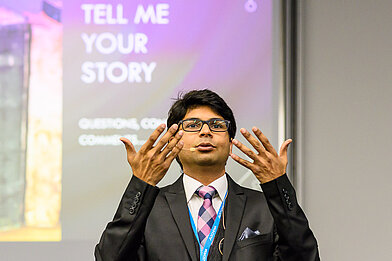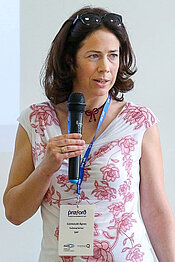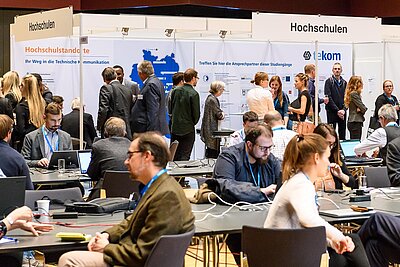
Many ways to reach your goal
Study or further training are the traditional routes into technical writing. But the profession is also perfect for career changers.
Paths to the Profession
Choosing a profession is one of the most important decisions in life. This mostly occurs directly after graduation, starting off with training or choosing study. However, for different reasons, many of those in the profession change their field of activity.

Lateral entry and direct training
In technical communication, both career paths can be encountered: About 20% of those in the profession have completed direct study of technical communication. Others practiced a different occupation beforehand and came to technical communication via lateral entry.

There are basically three ways to become a technical writer
- Undergraduate or graduate studies at a college or university
- Training for persons who have already graduated from college or university or already have vocational training in another specialized field
- The tekom internship for college or university graduates who have a university degree in a different field, or those who have left school
You will find an overview of your career options in our career-leaflet.
How I have become a technical writer?
When I was a child I wanted to be a ballerina, a teacher, a detective; all the usual stuff that a kid would want to do. And then from one day to the next, I have become a technical writer. How did that happen?
I was 24, freshly graduated from University with a degree in English and Sociology, and for the first time in my life I did not know what to do next. As I had no better idea and wanted to live my own life, I started to look for a job. Scanning the job ads, one day I came across a company that wanted to hire a technical writer. I had no clue what a technical writer was, so I almost skipped the ad, but then I realized that I possessed most of the required skills: fluency in English, excellence in writing, and good organizational and problem-solving skills.
I applied for the position and after a successful interview and writing test, I was given the position. On April 1 in 2003, I became a technical writer. Instead of April Fools’ joke, technical writing has become my profession.
I soon realized that technical communication is a perfect fit for my interest in both humanities and mathematics, it involves a wide variety of activities, and it provides endless opportunities for professional and personal development.
Agnes Czinkoczki (SAP)


To study technical communication means becoming an expert in imparting the knowledge of technology: linguistically, visually and using multimedia. In Germany, a plethora of study programs are offered in the field of technical communication under various designations. There are different emphases, but all of them provide interdisciplinary and intercultural training in the areas of language and communication, organization and visualization, media and technology. In the study programs, the basics of management, information technology, natural sciences and technology are also taught.
Professional diversity is one of the chief reasons students go into the field of technical communication.
Other important reasons for the career choice are:
- Interest in communication and languages
- Interest in technology
- Interest in communication management
- Handling media and technologies
- Interest in designing and visualizing
- Variety of study content
- Internationality
- Good professional prospects
89% of students state that their expectations for the study program were fully satisfied.

In Germany, Austria and Switzerland, there is a wide range of study programs in the field of technical communication:
- The majority are undergraduate study programs resulting in the "Bachelor of Arts", "Bachelor of Science" or "Bachelor of Engineering" degree.
- Some colleges and universities offer Master's programs.
- For employed persons, there are occasionally offerings of job-related study programs resulting in the "Professional Master of Science" degree.
Besides the specialist study programs mentioned, there is a variety of specialization-related study programs that, with the appropriate specialization, likewise prepare students for a career in technical communication.
This includes in particular studies in the following fields:
- Multi-lingual communication
- Specialist communication
- Translation and localization
- Terminology and terminology management
- Language technology
- Information management

There are various reasons why people change professions and work as lateral entrants in a new field of activity. Technical communication is the second career for many of them. They have in common study or professional education in another specialized field. Many used to be active as engineers, translators, language or humanities scholars.
Technical communication offers very good options for a new professional path, as the job market needs many workers, which the number of graduates cannot cover.
Lateral entrants are sought from the following fields in particular:
- Engineering sciences
- Technical occupations
- Translation
- Linguistics
- Media sciences
Graduates in the fields of software development, information technology, psychology, education, design, or the humanities can also gain a professional foothold in technical communication.
Employees without an initial professional education in a relevant specialized technical field have good job prospects, especially in less technology-focused sectors such as medical technology, consumer goods, software development, automobile industry or with service providers.
There are different ways of achieving lateral entry in technical communication, e.g.:
- Company-internal change to technical documentation
- Direct application for a position in the field of technical communication
- Developing a proprietary range of services in the field of technical communication
How to achieve lateral entry, and which skills for a career in technical communication you may already have, can be comprehensively determined in a tekom qualification consultation.
The key factor for success as a lateral entrant is a specific qualification as a technical writer. For human resources and specialist supervisors, verified professionalism is an important criterium for selecting applicants.
With a targeted training program, lateral entrants in technical communication can obtain training for and certification as a technical writer. Formally, competence and professional qualification are normally verified with the tekom certificate as "Technical Communicator".

For lateral entrants switching to technical communication from another professional background, participating in a comprehensive training program specifically targeting qualification is recommended. Options for becoming a professional technical writer consist of:
For those without previous knowledge in technical communication:
Several months of full-time direct retraining as a technical writer
This is recommended for all career changers who have not yet had contact with technical communication. Training lasts approximately half a year and, in addition to the teaching phases, normally includes an internship. If there are certain individual requirements, training is funded with an education voucher from the Employment Agency. Most full-time training programs result in formal certification by tekom as "Technical Communicator (tekom)".
For technical writers who have not studied technical communication, applicants without training, or those who do not have the option to pursue full-time training:
Job-related part-time training programs
These are suitable primarily for lateral entrants who are already active in technical communication who have developed their competences up to the present in "training on the job". With a job-related training program, they can expand their practical and theoretical knowledge and can obtain formal verification of their qualification with the tekom certificate. Those directly applying for a position in the field of technical communication without having concluded a training program can negotiate with their future employer about the possibility of the company financing a job-related training program for qualification in the first few months. This can be done in line with the stipulations in the employment contract, e.g. with regard to a minimum length of stay at the company. This model is similar to traineeship – with advantages for both sides: employees receive funded training, and the employer ensures that future employees have professional knowledge in their occupation. In addition, job-related training is a good option for those still active in another profession, e.g. in translation or marketing, who prospectively would like orientation in another subject, but who do not have the option of or framework conditions necessary for full-time training.
For ambitious lateral entrants:
Job-related study in technical communication
This way, ambitious lateral entrants can obtain a Master's degree in technical communication. In certain cases, initial study is not only not required, but relevant professional experience is even acknowledged.
For those who have left school, and university graduates:
The tekom internship
The tekom internship is an effective start, especially for those who have left school and university graduates in other specialized areas, e.g. engineering science, machine engineering, linguistics, and philology.
There are training opportunities with various private training providers.
tekom-accredited training programs can conclude with the tekom certification examination, and participants will obtain the international "Technical Communicator (tekom)" certificate. With the tekom certificate, lateral entrants receive formal verification of their high qualification in technical communication. The tekom certificate is known to companies, recognized by management employees and frequently a prerequisite in job advertisements. In the job market, an applicant’s qualifications including a university education and tekom certificate for the field of technical communication are evaluated very highly.

The tekom internship is designed particularly for graduates of technical, natural, social or humanities-related study programs, as well as for those who have left school. The structure and the contractual design are in line with an internship in journalism, offering a practical education in technical communication.
Interns are integrated into the workday as trainee technical writers and experience guided learning-by-doing. Company-based training is supplemented by a systematic external training program.
The internship lasts 24 months, is compensated with a fixed salary, and concludes with certification as a "Technical Communicator (tekom)". tekom has commissioned tecteam Bildungsinstitut with the placement of interns at companies and the external training.
Personas of Technical Writers
Recently, tekom Europe conducted a comprehensive, cross-European survey among technical communicators about the status of the profession and possible channels into technical writing.
We received over 200 responses to the survey from over 25 countries. To be able to better visualize the replies, we created so-called personas, fictional characters, summarizing some of the main and most important traits, general matches and interesting stories that we found while evaluating the questionnaires.
Michael Beck
Rebecca Walsh
Kimi Janssen
Antonio Nicoletti
Livia Badescu

Michael Beck, 36, Germany
He studied English for a teaching degree at university. He heard about technical writing in his translation classes and visited a separate training course in Technical Communication. He was not eager to find a job in teaching and technical communication appeared to be the most lucrative possibility, with the most opportunities for career advancement. He has now been working as a technical writer at an industrial company in the field of terminology for eight years.
“When I finished my teacher training, I was certain that I did not want to become a teacher anymore. So, I looked for alternatives and found a one-year trainee program at a technical communication company. After this year, I stayed in the field of technical communication. Combining linguistics, pedagogy, IT and languages is what makes the field so interesting for me.”

Rebecca Walsh, 44, Ireland
She studied translation at university. She used to work as a translator, but while translating documents of Technical Writers she got interested in the field and wanted to become a technical writer herself. She asked her team leader weather besides translating and correcting source texts, she might also improve those by restructuring, adding missing information, etc. Eventually, she switched to technical writing at her company. She found that jobs in technical communication had better hiring options. She had no additional training in technical communication. She has now been working in the software industry in the field of technical communication for about 18 years.
„I get to do things in the field of Technical Communication I really enjoy and I get a very good salary! I‘ve always been very detail-oriented when it comes to the written word, I‘ve always liked copy editing, I‘ve always been technically inclined, and in this job these skills are all an asset. I get paid and appreciated for obsessing over a comma or troubleshooting some obscure part of the application. What could be better? The skills match what I wanted to do and what I was looking for in a new and better paying career.”

Kimi Janssen, 25, Finland
His parents are technical writers. He is interested in structuring and classifying texts. He searched for a course of studies in this profession at university. After he got his master degree one year ago, he started working in the field of technical communication at a TC service provider.
“It's a really diverse and responsible profession. First, you are a kind of detective, investigating how the device works and what the user can do with it. Then you must be a lawyer, knowing all the legal regulations to be observed. Next you must translate your knowledge in a way the user understands. Then you manage translation and distribution of the content... With my help, the life of software users and our customers gets easier.”

Antonio Nicoletti, 52, Switzerland
He was trained as a car mechanic. Afterwards he studied engineering. When searching for a topic for his thesis, he improved the internal procedure of Technical Writing for his company. He has had no actual training in the field of technical communication, though he took a few online seminars. He has now been working for a car manufacturer in the field of technical communication for 13 years.
„I could never decide whether I wanted to work in a technical field or with texts/words, because I like to write and I like to explain. After my thesis to improve the internal procedure of technical communication, I was offered a job as a Technical Writer. Technical communication offers me the best of both worlds.”

Livia Badescu, 29, Romania
She studied Media and Communication but dropped out of college. She then had an internship at an international software company, where a colleague told her she was very analytical, organized and a good communicator, so she would be a perfect fit for technical writing. Before that she had never heard about the field of TC, but started searching for a study program afterwards. She has had several months of professional training. She has now been working as a technical writer for an industrial company for about 5 years, dealing with multimedia documentation.
„When I had a summer job as an intern at a tech company, I learned about the field of technical communication. I had the opportunity to develop video training and documentation content in multiple languages. After graduating, I followed this career path instead of media and communication which I had been studying until then. Technical communication offers a combination of technical content, communication and writing, with good salary and work-life-balance: some tasks can easily be done from home and the job is compatible with family life.”
